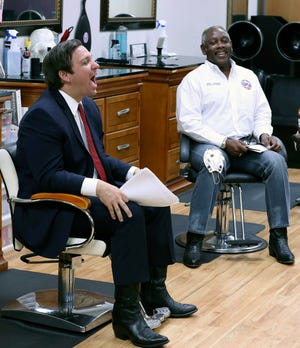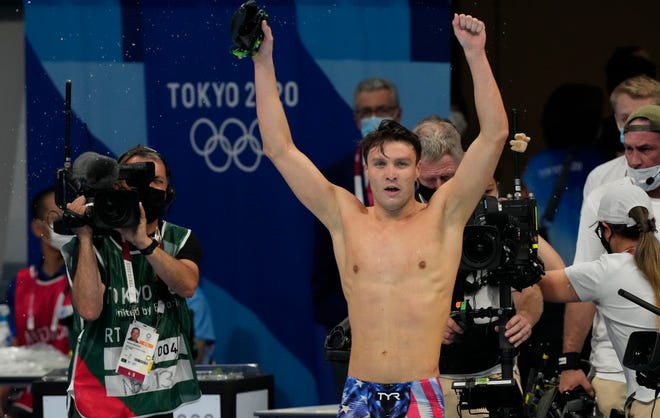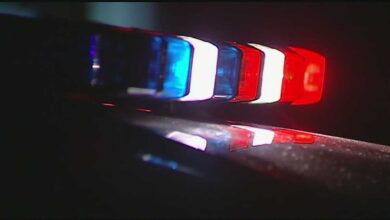
President Joe Biden forcefully condemned the Kremlin's brutal invasion of Ukraine and urged the world to stand firm behind efforts to repel the aggression, telling the United Nations that Russian leader Vladimir Putin was "reckless" in issuing a veiled threat about using his nuclear arsenal.
Russia's attacks on schools, hospitals and rail stations "should make your blood run cold," Biden said Wednesday at the United Nations hours after Putin tried to boost Russia's flagging fortunes in Ukraine by authorizing a partial mobilization of reservists.
“A permanent member of the U.N. Security Council invaded its neighbor, attempted to erase a sovereign state from the map. Russia has shamelessly violated the core tenets of the U.N. charter,” Biden told the body's General Assembly in New York.
In a televised address announcing Russia's first call-up of reservists since World War II, Putin accused the West of nuclear blackmail and said his government will use all its means to protect the country.
"Those who are attempting to blackmail us with nuclear weapons must be aware that the prevailing winds may also turn towards their side," Putin said.
Biden accused him of showing “reckless disregard” for Russia’s responsibilities as a signer of the nonproliferation treaty, and underscored that the U.N.'s core values are imperiled if it doesn't stand up to Putin.
"You cannot seize a nation's territory by force," Biden said. "Each of us in this body ... must be clear, firm and unwavering in our resolve.''
The U.N. audience also heard from Ukrainian President Volodymyr Zelenskyy, whose recorded address drew a standing ovation. Zelenskyy said Russia has made no serious effort to negotiate an end to the war.
"Probably you have heard different words from Russia about the talks, as if they were ready for them,” he said. “They talk about the talks but announce military mobilization.''
TURNING POINT IN THE WAR?:As Russia admits defeat in Kharkiv, Ukraine regains land, confidence
Recent developments:
►In the largest prisoner exchange of the war so far, Ukraine negotiated the release of 215 POWs, including 108 members of the Azov Battalion that made a heroic last stand at the steel plant in Mariupol and its top two leaders, The New York Times reported.
►Britain is sending Ukraine $500 million through the World Bank to help it purchase more natural gas, British Prime Minister Liz Truss said. Ukraine already has stored enough for about six months.
►Russian proxies in Donetsk province, part of the Donbas region that Russia seeks to claim, have conscripted up to 500 steel plant workers in Donetsk, essentially shutting down two steel plants, Ukraine officials said.
Captured Americans released in prisoner exchange
Two Americans fighting for Ukraine have been freed in a prisoner exchange after being captured in June in the Kharkiv region, sources close to them said Wednesday.
Andy Tai Ngoc Huynh, 27, and fellow Alabaman Alexander Drueke, 39, are both in Saudi Arabia, which brokered a swap with Russian-backed separatists that included eight other prisoners from four countries getting released, including five British nationals.
Huynh’s fiancé, Joy Black, told USA TODAY she got a surprise call from the U.S. Embassy in Saudi Arabia while at work Wednesday alerting her that Huynh was there. She got to speak with Huynh, who told her he'll go through medical checks before flying home.
“He said that he’s OK and he’s safe and healthy,” said Black, adding she was “very thankful” and “happy for the first time in like four months.”
Drueke’s aunt, Dianna Shaw, told USA TODAY in a text message that Drueke had also been freed and was in Saudi Arabia.
"We deeply appreciate everyone's prayers and especially the close communication and support of our elected officials, Ukrainian Ambassador (Oksana) Markarova, and our members of the US embassies in Ukraine and Saudi Arabia and the US Department of State,” she wrote.
Ukraine announced a high-profile prisoner exchange early Thursday where Zelenskky said his government had won freedom from Russian custody for 215 Ukrainian and foreign citizens.
The over 200 Ukrainians were exchanged for one man — pro-Russian opposition leader and an ally of Putin, Viktor Medvedchuk, according to The Guardian. The 68-year-old oligarch escaped from house arrest in Ukraine several days before Russia's invasion but was recaptured in April.
In another swap, Ukraine gained the release of five more citizens in exchange for 55 Russian prisoners, Zelenskyy said.
– Chris Kenning, Thao Nguyen
Protests against military call-up across Russia — 1,400 arrested
Defying strict laws against expressing disapproval of the war in Ukraine, legions of Russians took to the streets Wednesday to protest the government's plan to call into military service up to 300,000 of their fellow citizens.
More than 1,400 were arrested in anti-war demonstrations in 38 cities across the country, including Moscow and St. Petersburg, the independent Russian human rights group OVD-Info reported. These are first nationwide protests of the war since it began Feb. 24.
The Associated Press reported police in heavy body armor tackled demonstrators in front of Moscow shops, taking some away as they chanted, “No to war!”
One resident who wanted to remain anonymous told the news agency: “I’m not afraid of anything. The most valuable thing that they can take from us is the life of our children. I won’t give them life of my child.”
Russia passed a law in February that makes it a criminal offense, with punishment of up to 15 years in prison, to "discredit'' the military, including opposing the so-called "special military operation'' in Ukraine. Moscow's prosecutor’s office warned against such actions earlier in the day.
Putin announces 'partial' military mobilization
Putin announced a partial military mobilization in a televised address to his nation Wednesday as Ukraine's counteroffensive continued to push his invading troops back toward the Russian border.
Putin's plan, which starts by calling up reservists who previously served in the army, was unveiled hours after Russian-controlled regions in eastern and southern Ukraine announced plans to hold votes on becoming permanent parts of Russia.
Defense Minister Sergey Shoigu said 300,000 people – a little more than 1% of the 25 million reserves who fit the description – would be called up for military service.
Flights out of Russian cities quickly filled up and prices for the remaining seats skyrocketed after Putin's announcement, apparently amid fear the country might close its borders.
Putin had previously avoided the callups in his effort to minimize the effects of the war – a term he rejects in favor of "special military operation" – on the Russian population. But the conflict he had hoped would be completed in weeks has dragged on for seven months with little sign of ending soon.
He blamed the escalation on the West, telling his people the U.S. and its allies were attempting to break Russia "into an array of fatally warring regions and areas."
What is partial mobilization?
Putin said the partial mobilization means only Russians who are currently in the reserve will be subject to conscription. Initially those brought back into the military will include specialists and others with "relevant experience," Putin said.
He said that would be enough to overcome “the threats we face, namely to protect our homeland, its sovereignty and territorial integrity, to ensure the security of our people and people in the liberated territories.”
'NUCLEAR TERRORISM':Ukraine warns of Russia's actions after strike near plant
Did Putin threaten nuclear war?
Putin accused the West of nuclear blackmail, blaming Ukraine and its allies for the bombardments near the Zaporizhzhia nuclear power plant. Ukraine has blamed Russia for the bombings, which international regulators warn could trigger a nuclear disaster. Putin also accused leading NATO countries of suggesting that nuclear weapons could be used against Russia.
"I want to remind you that our country also has various means of destruction, and ... to protect Russia and our people, we will certainly use all the means at our disposal,” Putin said. “It’s not a bluff.”
THE WAR IN REVIEW:The week in Ukraine's war with Russia, including key events explained in 5 graphics
Democratic youth movement in Russia protests war
Russia's Vesna democratic youth movement called for protests across the nation in response to Putin's escalation of the war. The group urged frontline military units to refuse to participate in the ‘special operation’ or surrender as soon as possible. The website, difficult to reach from the U.S, provides a hotline for soldiers looking for a way out.
“You don’t have to die for Putin,” the group said in a statement. “You are needed in Russia by those who love you. For the authorities, you are just cannon fodder, where you will be squandered without any meaning or purpose.”
When will the referendum voting take place?
The referendum voting will start Friday in the Luhansk, Kherson and partly Russian-controlled Zaporizhzhia and Donetsk regions. Referendums have been discussed for weeks, but voting had not been expected until November. Ukraine's military gains likely compelled the Kremlin to move up the voting as an excuse to step up its military effort in those regions.
Former President Dmitry Medvedev, the deputy head of Russia’s Security Council chaired by Putin, said successful referendums would result in "irreversible" redrawn frontiers. Moscow, he warned, could use “any means” to defend them.
Ukrainian President Volodymyr Zelenskyy dismissed the voting as “noise” and thanked Ukraine’s allies for condemning the votes. U.S. national security adviser Jake Sullivan said Russia would manipulate "sham" results to annex the land.
"Let me be clear, if this does transpire, the United States will never recognize Russia’s claims to any purportedly annexed parts of Ukraine," Sullivan said.
After voting, talks will be 'impossible,' Russian lawmaker says
Any prospects for talks with Ukraine after the Donbas region votes to join Russia will be impossible, the Russian lower parliament's Foreign Affairs Committee chairman said. Leonid Slutsky said the negotiation process had passed the point of no return.
"Kyiv politicians said earlier that surrender was the only possible development" that could end the fighting, he said. "We were ready for talks, but Kyiv violated all the agreements."
Russia cracking down on deserters
Russia's lower of house of parliament voted this week to toughen laws against desertion, surrender and looting by Russian troops. Lawmakers also voted to introduce possible 10-year prison terms for soldiers refusing to fight. The laws are expected to win approval of the upper house and Putin.

Contributing: The Associated Press








